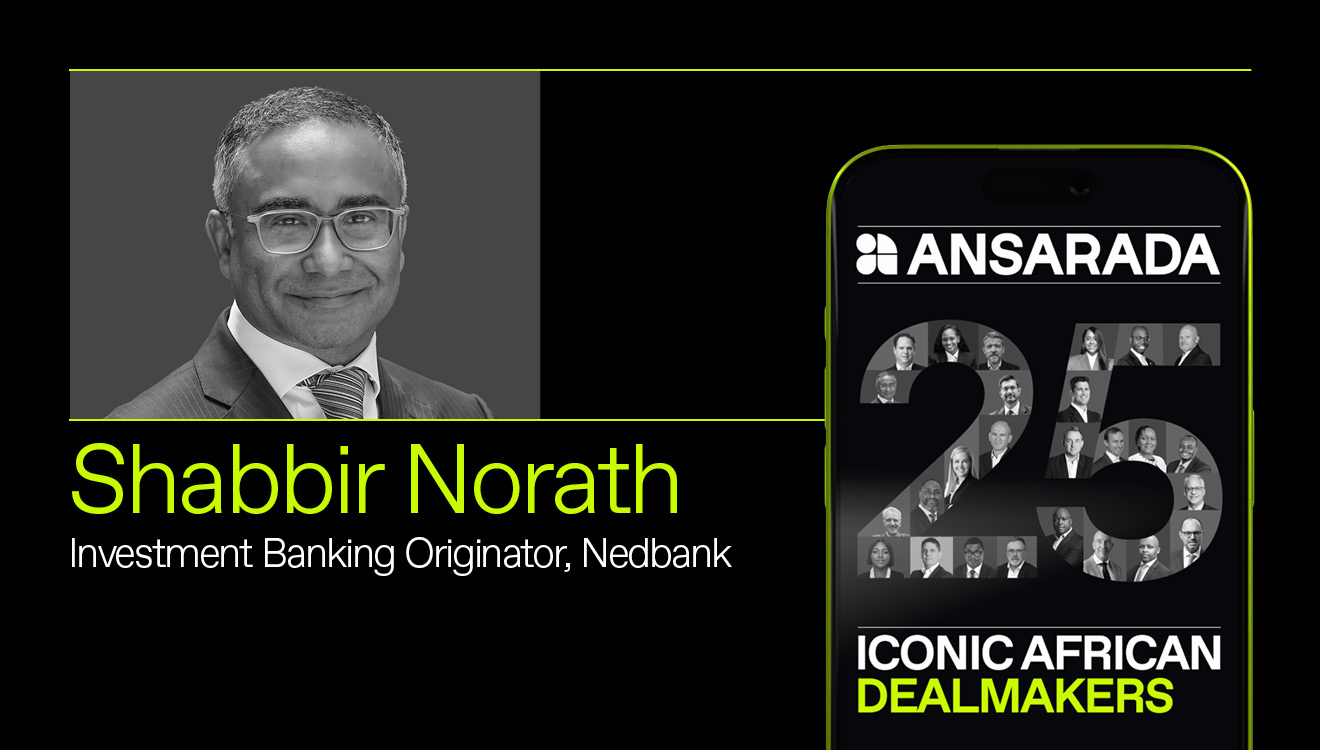Nedbank’s Shabbir Norath: A legacy of integrity and innovation in South African dealmaking
Shabbir reflects on the defining moments of his career, the evolution of deal-making, and the future of M&A in South Africa.
By AnsaradaMon Apr 07 2025Mergers and acquisitions, Due diligence and dealmaking, Advisors

After 24 years in corporate finance, including 14 years as Head of the team, Shabbir Norath transitioned into an origination role in January 2025. Having been involved in billion-rand deals and pioneering early Black Economic Empowerment (BEE) transaction structures still in use today, Shabbir’s career is a testament to innovation, resilience, and leadership in South Africa’s corporate finance landscape.
In this excerpt from our 25 Iconic African DealMakers Report, Shabbir shares the inspiration behind his career in corporate finance and dealmaking, contrasts his initial expectations with the realities of the M&A world, and reflects on core values, transformative deals like the Nedbank BEE transaction, and the potential future of M&A in South Africa.
Can you take us back to the beginning of your career? What inspired you to pursue corporate finance and deal‑making?
I’ve always been drawn to the corporate world, particularly investment banking. To be honest, my interest began after watching the movie Wall Street. It portrayed deal-making as exciting and glamorous, and that sparked my curiosity.
Of course, when you enter the field, you realize the reality is quite different. The long hours, financial modelling, and endless presentations are far from the glamour depicted in movies. But despite that, it’s been an incredibly fulfilling career.
How different were those early days compared to your initial expectations of M&A?
Nobody tells you about the less glamorous side of M&A—the late nights, all-nighters, and the sheer volume of work required to close a transaction. The movies show you the outcome, but not the behind-the-scenes grind. However, once you understand the impact of what you’re doing, it’s all worth it.
Gordon Gekko famously said, “Greed is good.” Today, deal‑making focuses more on ESG principles. What core values have guided you throughout your career?
People remember you for your integrity and character more than the deals you’ve closed. You could spend years building a reputation, but one misstep can undo it all. Trust, honesty, and doing things the right way are non-negotiable.
South Africa has always emphasized governance and compliance. Unlike some markets, our corporate culture values integrity—when we shake hands, it’s understood the deal is done properly. That’s a hallmark of our market.
Is there a deal you consider truly transformative for a company, industry, or the country?
The most significant transaction I’ve worked on was the BEE deal for Nedbank. At the time, we didn’t realize how challenging it would be to fund our BEE partners. That’s when we developed the notional vendor-funded structure, which has since become the industry standard.
This structure was particularly resilient, even during economic downturns like the 2008 financial crisis. The Nedbank/Old Mutual Group BEE deal paved the way for others, including MTN’s BEE transactions.
Imitation is the highest form of flattery. On the flip side, can you share a challenging project and the lessons you learned?
The MTN Zakhele Futhi deal stands out. During the transaction, MTN was fined in Nigeria, which forced us to pause everything until the cautionaries were lifted.
This wasn’t just a typical BEE deal—it involved a retail scheme. We utilized the entire Nedbank branch network to distribute shares to the public. I still remember a gogo (elderly woman) at a town hall meeting thanking us for implementing the deal because it allowed her to help her grandchildren. Moments like that remind you of the broader impact of your work.
Do you think we’re approaching the next wave of BEE transactions, given that many ten‑year lock‑ins are ending?
Many BEE transactions have matured or unwound, so we’ll see new deals, but not at the scale we saw post-1994. Certain sectors will require new transactions, but the wave won’t be as significant as before.
Which sectors in South Africa have the most potential for future M&A activity?
Foreign investors see South African companies as well-run and undervalued. Key sectors include metals and mining, energy, and consumer markets. Additionally, East African markets like Kenya, Tanzania, and Uganda are attracting interest.
If you had to predict the M&A landscape over the next decade, what would it look like?
Regulation will play a critical role. Competition Commission scrutiny makes deals harder to implement. However, if South Africa creates a more investor-friendly environment, we could attract significant foreign direct investment (FDI). The new Trade Minister, Parks Tau, seems aware of this and may push for policies that encourage investment.
How do you reflect on your legacy, and what do you hope to be remembered for?
I’d like to be remembered for my integrity and for structuring deals that stood the test of time. It’s easy to close a transaction, but creating lasting value requires careful planning and foresight.
What advice would you give your younger self starting out in 2000?
It’s a journey, not a sprint. Resilience and perseverance are essential in this industry.


